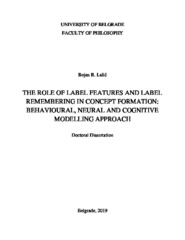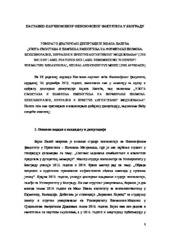Приказ основних података о дисертацији
The role of label features and label remembering in concept formation: behavioural, neural and cognitive modeling approach
Улога својстава и памћења именитеља на формирање појмова: бихејвиорални, неурални и приступ когнитивног моделовања
| dc.contributor.advisor | Ković, Vanja | |
| dc.contributor.other | Lalović, Dejan | |
| dc.contributor.other | Pajić, Dejan | |
| dc.contributor.other | Tadić, Predrag | |
| dc.contributor.other | Westermann, Gert | |
| dc.creator | Lalić, Bojan R. | |
| dc.date.accessioned | 2020-09-25T15:02:27Z | |
| dc.date.available | 2020-09-25T15:02:27Z | |
| dc.date.issued | 2020-06-09 | |
| dc.identifier.uri | http://eteze.bg.ac.rs/application/showtheses?thesesId=7595 | |
| dc.identifier.uri | https://fedorabg.bg.ac.rs/fedora/get/o:22530/bdef:Content/download | |
| dc.identifier.uri | http://vbs.rs/scripts/cobiss?command=DISPLAY&base=70036&RID=15740425 | |
| dc.identifier.uri | https://nardus.mpn.gov.rs/handle/123456789/17436 | |
| dc.description.abstract | The basic aim of this dissertation was to demonstrate the way in which different label features influence concept formation, specifically their learning and generalization. These labels could be verbal or non-verbal, presented auditory or visually. In the experiments, participants learned novel categories (aliens) labelled with novel labels (pseudo-words or novel non-verbal emblems and sounds). During experiments, ERPs were recorded. In Chapter I, the effects of verbal auditory labels on concept formation were examined, specifically, the way in which the level of phonological difference between labels influence the learning of novel categories. Results showed that learning of categories labelled with phonologically more different labels was significantly faster and generalized better compared to categories labelled with phonologically more similar labels. Furthermore, this property is independent from the effects of sound symbolism. In Chapter II, the effects of differences of non-verbal labels (visual or auditory) on category learning was examined. Results showed that there were no differences of influence of non-verbal labels on category learning, no matter if they were more different or not. In Chapter III, relations between the effects of verbal and non-verbal labels on category learning were examined. Results showed that auditory verbal labels which were phonologically more different led to faster learning and generalization of novel categories, which was not the case with other types of labels. In Chapter IV, the effects of explicit instruction given to the participants in the experiments to pay special attention to the labels during categorisation and to learn them were examined. Results showed that participants learned faster and generalized better once the instruction was given, while the absence of instruction led to the diminishing of label effects on category learning. Finally, in Chapter V, a neural network was constructed, the task of which was to simulate the effects of phonological differences of labels on category learning. The model successfully simulated these differences, since it learned categories labelled with phonologically more different labels faster compared to the less different ones. From the results obtained in this dissertation we can conclude that the effects of label features on category learning is significant, which is specially the case with auditory verbal labels and their phonological difference. As a result of these findings, category learning based on the difference level hypothesis was designed. This hypothesis explains category learning as probability, which is based on the compound difference between visual properties of the categories and the difference of their labels. These results lead to the more fundamental conclusion that relations between language and thought are mutually influential and that these entities are not completely independent | en |
| dc.description.abstract | Основни циљ ове дисертације је био да покаже како различите карактеристике именитеља утичу на формирање појмова, тј. на њихово учење и генерализацију. Ти именитељи могу бити вербални и невербални, изложени аудитивно или визуелно. Коришћени су експерименти у којима су испитаници учили нове категорије (ванземаљце) именоване новим именитељима (пресудо-речима или претходно невиђеним невербалним амблемима и звуковима), при чему су испитаницима снимани и ERP мождани таласи. У I поглављу, испитивана је улога аудитивних вербалних именитеља на формирање појмова, тачније како фонолошка разлика именитеља утиче на учење нових категорија. Резултати су показали да је учење категорија именовано фонолошки различитијим именитељима брже, а генерализација боља у односу на оне именоване фонолошки сличнијим именитељима. Такође, ова особина је независна од утицаја језичког симболизма. У II поглављу, испитиван је утицај различитости невербалних именитеља на учење категорија (визуелних и аудитивних). Резултати су показали да не постоје разлике у утицају невербалних именитеља на учење категорија, без обзира на то да ли су они различитији или не. У III поглављу, испитиван је однос утицаја вербалних и невербалних именитеља на учење категорија. Резултати су показали да само аудитивни вербални именитељи који су фонолошки различити доводе до бржег учења и генералицације, што није случај са осталим врстама именитеља. У IV поглављу је испитиван утицај експлицитне инструкције испитаницима да обрате пажњу на именитеље и да их запамте. Резултати су показали да испитаници брже уче и боље генерализују категорије када добију инструкцију, док изостанком инструкције ефекти на учење категорија изостају. Најзад, у V поглављу је конструисана неурална мрежа чији је задатак био да симулира ефекте фонолошке различитости именитеља. Модел је успешно симулирао ове различитости, јер је показао да је учење брже када су фонолошке разлике између именитеља веће. Резултати добијени у дисертацији наводе на закључак да је утицај карактеристика именитеља на усвајање појмова изузетно битан и да се пре свега односи на вербалне именитеље и њихове фонолошке разлике. Као производ ових резултата, дефинисана је хипотеза учења категорија базираног на нивоу разлике. Ова хипотеза описује учење категорија као вероватноћу која је базирана на заједничкој разлици између њихових визуелних карактеристика и разлика у именитељима. Такви резултати наводе на фундаменталнији закључак да је однос мишљења и језика међузависан и да они никако нису потпуно независни | sr |
| dc.format | application/pdf | |
| dc.language | en | |
| dc.publisher | Универзитет у Београду, Филозофски факултет | sr |
| dc.rights | openAccess | en |
| dc.rights.uri | https://creativecommons.org/licenses/by-nc-nd/4.0/ | |
| dc.source | Универзитет у Београду | sr |
| dc.subject | Categorisation | en |
| dc.subject | Категоризација | sr |
| dc.subject | language and thought | en |
| dc.subject | category learning | en |
| dc.subject | category labels | en |
| dc.subject | label phonological differences | en |
| dc.subject | category learning based on the difference level | en |
| dc.subject | sound symbolism | en |
| dc.subject | evoked potentials | en |
| dc.subject | cognitive modelling | en |
| dc.subject | мишљење и језик | sr |
| dc.subject | учење категорија | sr |
| dc.subject | именитељи категорија | sr |
| dc.subject | фонолошке разлике именитеља | sr |
| dc.subject | учење категорија базираног на нивоу разлике | sr |
| dc.subject | језички симболизам | sr |
| dc.subject | евоцирани потенцијали | sr |
| dc.subject | когнитивно моделовање | sr |
| dc.title | The role of label features and label remembering in concept formation: behavioural, neural and cognitive modeling approach | en |
| dc.title.alternative | Улога својстава и памћења именитеља на формирање појмова: бихејвиорални, неурални и приступ когнитивног моделовања | sr |
| dc.type | doctoralThesis | en |
| dc.rights.license | BY-NC-ND | |
| dc.identifier.fulltext | https://nardus.mpn.gov.rs/bitstream/id/65468/IzvestajKomisije23263.pdf | |
| dc.identifier.fulltext | https://nardus.mpn.gov.rs/bitstream/id/65467/Disertacija.pdf | |
| dc.identifier.rcub | https://hdl.handle.net/21.15107/rcub_nardus_17436 |



